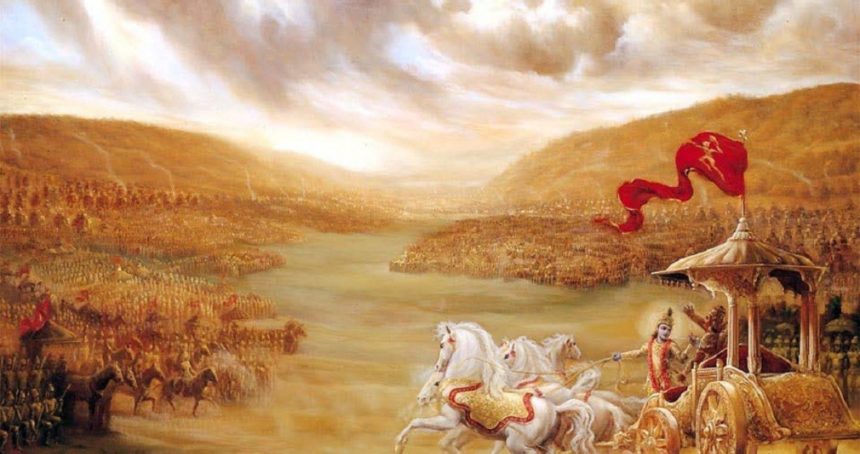Renouncing fruits of actions, the yogi attains to supreme peace.
Sung by God: V (The Way of Renouncing Action)

Said Arjun: You hail renouncing of actions, and the Way of Action too;
O Krishna! Tell me for certain which one is preferred among these two!
God said: Renunciation and the Way of Action both lead to liberation;
But of these, the Way of Action is far better than forsaking action.
He who neither loathes nor yearns, is known as a constant renunciate;
For O mighty-armed one! Lacking dualities, from shackles he swiftly emancipates.
“Renunciation and the discipline of action differ” – this is all child’s talk;
The practice of one yields the fruit of both, at this the wise never balk.
The station that one attains by practicing the discipline of knowledge
Is the same reached by those who’ve taken selfless action as their pledge;
He who sees renunciation and disciplined action as one, is verily a sage.
However, O mighty-armed prince! It is difficult to renounce without discipline;
Whereas a sage may attain Brahman in no time if he is disciplined within.
That pure soul who has conquered his self and has mastered his senses,
That yogi who thus on the Supreme Self all his attention condenses,
The one who’s steadfast in discipline, and has felt all beings in his Being,
Such a one is never tainted by actions – even when he is intently acting.
The Knower of Reality is rooted in discipline, and thus he should ever think:
“Nothing whatsoever do I do” even while seeing, listening, touching, smelling,
Eating, moving, sleeping, breathing, speaking, releasing, or while accepting,
Or while he’s opening and shutting his two eyes – at once always fully realising
That it is only the senses which on the objects of senses are operating.
One who surrenders all actions to Brahman and works renouncing attachment,
Such a one is not stained by sin, as by water a lotus leaf is never stained.
Acting merely through his body, mind, intellect and the senses,
The yogi acts without longing for results – his self he thus cleanses.
Thus renouncing fruits of actions, the yogi attains to supreme peace;
It is the peace of liberation, arising from that steadfast discipline of his.
But the man without discipline – because he acts out of desire’s impulse –
Is attached to his actions’ fruits; so he gets trapped in dualities that are false.
Disavowing all his actions mentally, the self-controlled man contently rests;
The embodied one never acts, nor causes any, dwelling in the town of nine gates.
There He lives, the all-pervading Master: beyond all qualities or fleeting states.
Neither this Master impels worldly actions, nor does He wield authority,
Nor any contact with the results of actions; it is one’s nature that acts solely.
The omnipresent Master accepts neither the good deeds of anyone, nor even the bad;
Delusion comes from ignorance veiling knowledge: this makes all creatures sad.
But if by sheer knowledge such ignorance of one’s True Self is shattered,
Then knowledge reveals that Supreme Truth, as in the bright sunrays scattered.
Having his thought and dedication, even his very being fixed on That,
Making That his Supreme Goal, the one who reaches this Supreme State –
They’re never compelled to return anymore, rid by knowledge of their sinful fate.
The wise man sees with the same eye a learned and courteous Brahmin, a cow,
An elephant, a dog, and the man who eats the dog – of that there’s no doubt!
Those who’ve steadied their mind in equanimity and are blameless as the Brahman,
They’ve in this very realm conquered birth and death, hence they dwell in Brahman.
Dwelling inside the Brahman forever, the unbewildered man of stable intellect
Does neither rejoice in receiving the pleasant, nor anxiety in the opposite reflect.
Thro’ detachment for outward contacts, he receives the bliss that is in the Atman,
He attains that everlasting joy thro’ his constant contemplation of Brahman.
O Son of Kunti! Know that these pleasures of outward contacts give suffering,
These have a beginning and an end, in them the wise are not seen indulging.
He who endures the urges of desire and wrath in this realm before his decease,
That man is a disciplined yogi, that man is full of bliss.
Finding contentment, relief, as well as an eternal light within,
Merging with Brahman, nirvana into Brahman is attained by that yogin.
This nirvana those sages receive, whose sins have been withered;
Doubts annulled, self-restrained, in welfare of all beings who’re immersed.
Self-controlled, Self-realised renouncers, fully rid of desire and wrath,
Soon attain nirvana in Brahman; they swiftly reach the Abode of God.
Keeping aloof from outward contacts, fixing his sight between the brows,
Balancing the ebbing and flowing of his breaths passing through the nose,
The sage with subdued senses, mind and intellect, with moksha as his goal,
Rid of urges, fears and wrath, is ever-free. Knowing Me as the Supreme Soul,
The partaker of worship and offerings, as the Friend of all, peace is gained by that soul.

Leave a Reply